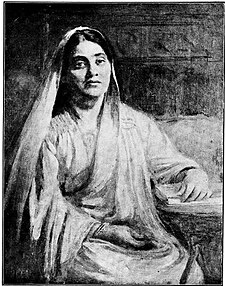Abala Bose
 From Wikipedia the free encyclopedia
From Wikipedia the free encyclopedia
Lady Abala Bose | |
|---|---|
 | |
| Born | Abala Das 8 August 1864 |
| Died | 25 April 1951 (aged 85) Kolkata, India |
| Occupation | Social worker |
| Known for | Feminist movement |
| Spouse | Sir Jagadish Chandra Bose (m. 1887) |
Abala, Lady Bose (8 August 1864 – 25 April 1951) was an Indian social worker and feminist. She was known for her efforts in women's education and her contribution towards helping widows.[1] Her father was the social reformer Durgamohan Das and her mother was Brahmamoyee Devi. Abala Bose was a student of the Brahma Balika Vidyalay in Kolkata (then Calcutta) and subsequently enrolled at Bethune School from where she passed the Entrance Examination in 1881.
Career
[edit]In the 1880s, Abala was denied admission to Calcutta Medical College as female students were not yet accepted in the college. She went to Madras (now Chennai) in 1882 on Bengal government scholarship to study medicine but had to give up because of ill health. However, the Madras Medical College awarded her with a Certificate of Honour.
In 1887, she married scientist Jagadish Chandra Bose. She accompanied her husband in several travels abroad in later years.[2]
Apart from working as an educator, Bose was an early feminist. Writing in English magazine Modern Review, she argued that women should get a better education, "not because we may make better matches for our girls ... not even that the services of the daughter-in-law may be more valuable in the home of her adoption, but because a woman like a man is first of all a mind, and only in the second place physical and a body."[3]
Upon her husband's knighthood in 1916, she became Lady Bose.


Lady Bose served as Secretary of Brahmo Balika Shikshalaya from 1910 to 1936. She died on 25 April 1951, aged 85.[1]
References
[edit]- ^ a b Sengupta, Subodh Chandra and Bose, Anjali (editors), 1976/1998, Sansad Bangali Charitabhidhan (Biographical dictionary) Vol I, (in Bengali), p23, ISBN 81-85626-65-0
- ^ Sengupta, Subodh Chandra and Bose, Anjali (editors), 1976/1998, Sansad Bangali Charitabhidhan (Biographical dictionary) Vol I, p23, ISBN 8185626650
- ^ Ray, Bharati (1990). "Women in Calcutta: the Years of Change". In Chaudhuri, Sukanta (ed.). Calcutta: The Living City. Vol. II. Oxford University Press. p. 36. ISBN 978-0-19-563697-0.
External links
[edit] Media related to Abala Bose at Wikimedia Commons
Media related to Abala Bose at Wikimedia Commons- Abala Bose materials at the South Asian American Digital Archive (SAADA)